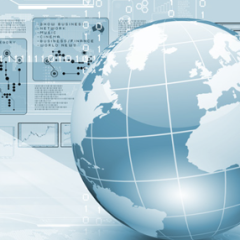"Fair Share": Google, Trust, Anti-Trust....and What Happens Next
Last week may have shed as much heat as light on the trials and tribulations of the American press, as visceral responses to the state of the trade grew sharper.
We saw a number of newspaper sentiments, from enlightened to reactionary, conflated together, given their paid-fire presentation in San Diego, as a multitude of fighting words pouring into the debate from San Diego's Newspaper Association of America/AP board meeting confabs, and its aftermath. "Anti-piracy". "Copyright". "BS detectors". "Ads with narrative and engagement.” "OEMs, OPMs and VARs."
We've seen name-calling, thoughtful response and ping-pong intellectual matches that make your head hurt, like this one on the always-engaging Nieman Lab
To the debate, I modestly had added the notion of "Fair Share," a new business reckoning between search engine aggregators, led by Google, and major news producers, old and new. That reckoning, I suggested, should recognize that Google is getting too much value and news producers too little out of of the current relationship.
To my reckoning notion, I got a lot of response, with a wide spectrum of approval ("This is one of the most clearheaded, lucidly written analyses I've encountered regarding this situation") and disapproval (My fave, off Twitter: "I rarely agree with anything Ken Doctor writes.") Some dismissed the notion of righting news producers' relationship as "philanthropy." Far from it. I'm keenly aware of the separate battle over profit-seeking vs. non-profit journalism, and I'm an agnostic about that. Whatever produces more good journalism I favor, and there's no doubt it will be some mix of profit- and non-profit-based.
My Fair Share argument, though, has nothing to with philanthropy, and everything to do with plain old business.
In basic business terms, the news industry is a supplier – and an important one – to Google and the other search engines. In fact, it's a supplier/manufacturer (of traffic and ad revenue) relationship that has gotten out of whack, and is therefore useful for both parties to adjust. After all, manufacturers, too, have problems as their higher-quality supply lines dwindle.
Individual news companies, and here I mean the Politicos, the MinnPosts, the Techcrunches, the Global Posts as well as Media News, Gannett, New York Times, ABC and the BBC, have had relatively little leverage of late. Their inability to exercise leverage made sense historically.
Take us back in the news time machine to 1998, a nice tweener period, and one that predated many of the companies above. Legacy news companies — big 'ole big iron media — could sense that their dominant place in the world was being shaken a bit, but AOL, Yahoo, Lycos (!?) and a couple of others didn't seem like Big Brother. So that legacy news industry had to tread lightly in pressing its case — anti-trust seemed real for an industry in part built on city-by-city monopoly.
In 1998, Google was born, and in the decade since the roles have been reversed. What was city-by-city monopoly has splintered, with local and regional advertising marketplaces much more diverse.
On the other hand, Google, in particular, has become the gateway of our times, making a can't-refuse offer. It is the number one sender of traffic to news sites — 25-35% as a rule. In saying that news companies are free to tell Google not to index them, and that Google will be glad to comply, you can practically hear the smile behind the statement. It's like Microsoft telling suppliers they were welcome to work with others if they didn't like the rules on Windows partnership.
It's a choice that's not really a choice at this point.
So as suppliers — and here again I look broadly from AP and Business Week and USA Today to The Huffington Post to PaidContent to Demand Media — it's about renegotiating the supply relationship.
It doesn't mean having to erect pay walls. It doesn't mean a pause in radically reorganizing and rethinking news companies structures and products in this new hybrid age. it doesn't mean philanthropy. It doesn't mean calling Google evil or denying its genius. It doesn't mean limiting the free flow of content and debate on the web.
It is about re-setting a new relationship of trust, trust that there's some equity in the deals.
In the always quotable expression of Michael Corleone, ""It's not personal, it's just business."
the recent web parlor talk into action this year. Each of the forces will have an impact on each other, and it's impossible to say at this point, which will have the greatest impact.
- Business pressure: Plain-old negotiation, but maybe done differently. How much can these suppliers work together now, given the splintering of their power. How much can they jointly negotiate? The Yahoo News Consortium is an emerging success, and resulted from intelligent, joint supplier negotiation. In fact, if Google is the the big pipeline now, how successful might the news industry be in working out new relationships with #s 2, 3 and 4. Yahoo's already a steady date (good piece ["Is Yahoo a Better Friend to Newspapers Than Google?"] on that angle by Miguel Helft), and Microsoft sees its opening to get back in the game. Meanwhile, AOL's traffic is still significant.
- Technological pressure: News companies are getting well beyond engaging journalists, putting the content on their destination sites or wires, and just letting it hang out there in the cybersphere. Many are getting smarter about content, improving what I call their Content IQ. Content IQ means knowing your produced content intimately — subject/niche tagging, business rule embedding, content tracking, ad network connecting and more. The higher the Content IQ, the better negotiating position content producers find themselves in. That's because they are no longer wholly dependent on others — think first, but not only here, of search aggregators. (One big next step, the mobile carriers.)
- Legal pressure: If we've seen a major role reversal in a decade, the term "anti-trust" offers renewed interest. Would the new Justice Department see news industry coordination as anti-trust? Remember, that the news industry is getting a far smaller percentage of the national ad pie than it used to. Recall also that Google is not just the biggest news pipeline, but is the by-far dominant leader
(75%+)(72.3%) in paid search, the fastest-growing part of the ad industry in the western world. Recall the concerns about the Google/Yahoo paid search tie-up attempted in 2008 as Jerry Yang looked for a workable strategy. The anti-trust buzz, on both sides of the pond, scuttled that and since Google has only grown more dominant. So in a reversal of fortune, is the anti-trust bogeyman shoe on the other — Google's — foot? - Political pressure: This is an intriguing one. As we speak, politically progressive and labor forces are lobbying the Democratic power structure — Administration and Congress — do something about the meltdown of the American press. We've seen Sen. Cardin's bill somehow easing for-profits' transition to non-profits and House Speaker Nancy Pelosi's bid to relax anti-trust, so she'd had something left to read in newsprint when she comes home. These forces, too, are starting to get on board for a reckoning of news producers' relationships with search aggregators. On the other hand, who has emerged as one of President Obama's top tech advisors and occasional surrogate but Google CEO Eric Schmidt. Progressives want Obama to whisper into Schmidt's ear, "Get something done," while fearing that Eric will whisper into Barack's ear, "just let it sort itself out."
Add it all up and you may have an answer to a often-asked question I discussed with a number of reporters last week: Why would Google agree to re-do its relationship with news providers? Multiple pressure on multiple fronts might make it easier for Google to move on the "it's not broken, why fix it," relationship. It may want to avoid becoming the new Microsoft.




